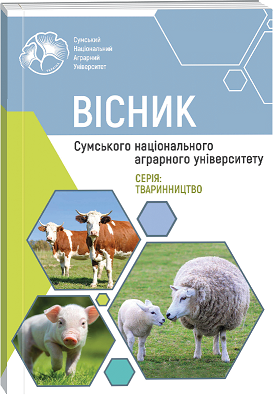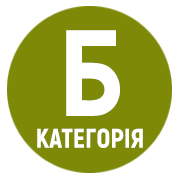CURRENT GENEALOGICAL STRUCTURE OF SWISS BREEDS USED IN UKRAINE
Abstract
The article presents the results of research into the peculiarities of the modern genealogical structure of breeders of the Swiss breed, which are allowed to reproduce and which were used in breeding farms for the breeding of the Ukrainian brown dairy breed. The study was conducted by analyzing the catalogs of breeders of dairy and meat-milk breeds allowed to reproduce on the breeding stock for the period 2015-2024 and the data of the international website https://www.cdn.ca. The genealogical structure of the breeding stock and the level of productivity of livestock were determined based on the data of the pedigree record - credit rating report (Form 5-MOL) of the breeding farms of the SE DG ISGPS of the National Academy of Sciences of the Sumy District and TDV "Mayak" of the Okhtyr District. During the last ten years, a family of thirty Swiss breeders of six genealogical lines was used in Ukraine. About forty percent of the breeders were representatives of the Eleganta 148551 line, twenty percent - of the Distinction 159523 line. The representatives of the Stretch 143612, Pavena 136140, Vigate 083352, and Luddy 125640 lines totaled less than forty percent. The offspring of all genealogical lines had certain features of origin, namely, they were obtained as a result of intraline breeding and crossing of lines. The Elegant line 148551 is developed through three branches: Telstara 170838, Ka Va Balisona 172466, Simona Elegante 148551 176173. The Distinction line 159523 is spread through the Jubilee branch 170157, and the Stretch line 143612 is Improvera 163153493. Interlineal differentiation was established according to the level of milk productivity of daughters. The superiority of the daughters of breeders of the Distinction 159523 lines, whose weight in the first lactation exceeded 6.0 thousand kg, was established. At the same time, bulls of the Vigate 083352 line prevail in terms of breeding value for milk yield (+1166). Most of the breeders of the lines Elegant 148551, Distinction 159523 and Pavena 136140 came from the United States of America (50%, 61%, 44%, respectively). Most breeders of the Stretch 143612 line - 41% - were of Swiss origin. Most of the breeders of the Vigate 083352 line came from Austria (44%). Among the Swiss bulls, more than 30% were evaluated for the beta-casein gene, 40% of which had the desired A2A2 genotype. According to the kappa-casein gene genotype, 35% of breeders were evaluated, of which 26% had the desired BB genotype. A significant difference was established between breeders of different lineal origins by year of birth. The majority of offspring that are allowed to reproduce are located in 7-9 rows from the progenitor, and genealogical lines are branched, therefore, in order to organize them, it is necessary to allocate new branches (and possibly genealogical groups) within each. The expansion of the genealogical structure of breeders can also be facilitated by the use of breeders of the original brown German breed on the mother stock of the Ukrainian brown dairy breed.
References
2. Boiko, Yu. M. (2013). Perspektyva selektsii khudoby ukrainskoi buroi molochnoi porody v aspekti liniinoho rozvedennia z vrakhuvanniam svitovykh tendentsii tryvalosti linii u pokolinnia [Perspektyva selektsii khudoby ukrainskoi buroi molochnoi porody v aspekti liniinoho rozvedennia z vrakhuvanniam svitovykh tendentsii tryvalosti linii u pokolinnia]. Visnyk SNAU. 1(22), 20-26. (in Ukrainian).
3. Bolhova, N. V. (2005). Zahalna kharakterystyka ta osoblyvosti buroi khudoby [General characteristics and features of brown cattle]. Visnyk SNAU. 9-10, 13-16. (in Ukrainian).
4. Bondarchuk, L. V., Skliarenko, Yu. I. (2017). Retrospektyvnyi analiz populiatsii lebedynskoi porody v umovakh Pivnichno-Skhidnoho rehionu Ukrainy [Retrospective analysis of the population of the Lebedin breed in the minds of Pivnichno-Skhidny region of Ukraine]. Visnyk Sumskoho natsionalnoho ahrarnoho universytetu. Seriia: Tvarynnytstvo. 5/1(31), 192-200. (in Ukrainian).
5. Khmelnychyi, L. M., Kryvonos, Yu. O., Burnatnyi, S. V., Samokhina, Ye. A. (2008). Kharakterystyka henealohichnykh ta zavodskykh linii buroi khudoby za molochnoiu produktyvnistiu [Characteristics of genealogical and factory lines of brown cattle in terms of milk productivity]. Visnyk SNAU 10 (15), 123-127. (in Ukrainian).
6. Khmelnychyi, L. M., Salohub, A. M., Shulha, O. V., Brazhnyi, Yu. I. (2007). Vplyv linii ta buhaiv - plidnykiv na hospodarsko korysni oznaky koriv ukrainskoi buroi molochnoi porody [Influence of lines and breeder bulls on economically useful traits of Ukrainian brown dairy cows]. Visnyk SNAU. 3(12), 94-99. (in Ukrainian).
7. Ladyka, V., Metlytska, O., Skliarenko, Y., Pavlenko, Y. (2019). Genetic analysis of sires of lebedyn cattle and related populations. Scientific Papers Series Management, Economic Engineering in Agriculture and Rural Development. 19 (4), 4. Р. 149-159
8. Ladyka, V., Skliarenko, Y., Pavlenko, Y. (2022). Usage of DNA Testing by CSN2 and CSN3 Genes for conservation and Improvement of the North–East of Ukraine. Monograph. Riga, Latvia : «Baltija Publishing», . 152
9. Ladyka, V. I. Bratushka, R. V., Boiko, Yu. M. (2012). Perspektyvy selektsii burykh porid molochnoi khudoby [Prospects for the selection of brown breeds of dairy cattle]. Rozvedennia i henetyka tvaryn, 46, 13-15. (in Ukrainian).
10. Ladyka, V. I., Khmelnychyi, L. M., Salohub, A. M., Shevchenko, A. P.(2011). Perspektyva selektsiino-pleminnoi roboty u molochnomu skotarstvi Sumshchyny [The perspective of selection and breeding work in dairy cattle breeding of Sumy Oblast]. Rozvedennia i henetyka tvary. 46, 34-37. (in Ukrainian).
11. Ladyka, V. I., Polupan, Yu. P., Vdovichenko, U. V. (2019). Conservation of gene pools of local cattle breeds. Lublin 167
12. Ladyka, V. I., Vechorka, V. V., Kuchkova, T. P., Skliarenko, Yu. I., Pavlenko, Yu. M. (2023). Henealohichna struktura ukrainskoi buroi molochnoi porody [Genealogical structure of the Ukrainian brown dairy breed]. Rozvedennia i henetyka tvaryn, 65, 90-106. (in Ukrainian).
13. Oblyvantsov, V. V. (2003). Kharakterystyka tvaryn, zapysanykh do I tomu Derzhavnoi knyhy pleminnykh tvaryn burykh porid. Derzhavna knyha pleminnykh tvaryn burykh porid velykoi rohatoi khudoby [Characteristics of the animals recorded in Volume I of the State Book of Breeding Animals of Brown Breeds]. Kyiv : PPNV, 2003. T. 1., 4–37. (in Ukrainian).
14. Radchenko, N. P., Lysianska, L. M., Skliarenko, Yu. I. (2005). Rozvedennia za liniiamy, yak metod pleminnoi roboty. [Breeding behind the lines, like a method of breeding work]. Rozvedennia i henetyky tvaryn 38, 186-189 (in Ukrainian).
15. Skliarenko, Yu. I. (2018). Henezys porodnoho peretvorennia lebedynskoi khudoby z vykorystanniam svitovoho henofondu [The genesis of breed transformation of Swan cattle using the world gene pool]. monohrafiia. Sumy, Vyd-vo «MakDen», 224 (in Ukrainian).

 ISSN
ISSN  ISSN
ISSN 



